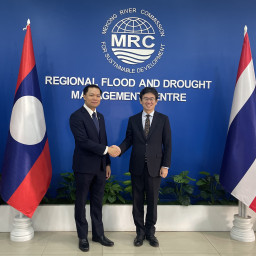Reporting Findings and Results from the Council Study to Member Countries
The Study on the Sustainable Development and Management of the Mekong River, including impacts by mainstream hydropower projects – known as the ‘Council Study’ was conducted by the Mekong River Commission (MRC) from 2012 to 2017. Following a number of technical consultations at the regional and national levels, as well as stakeholder feedback at open forums, the final report is being refined for publishing in mid-February 2018.
Key findings and messages are now being reported in a series of national meetings in the member countries by teams of MRC Secretariat staff. On 23 January 2018, a comprehensive reporting on the assessment results were delivered by the MRCS to a national technical meeting of the Lao National Mekong Committee Secretariat and some line agencies. Then, on 26 January 2018, a high-level meeting of the Lao National Mekong Committee members, chaired by the Minister of Natural Resources and Environment, with participation from vice ministers and directors-general of all key line agencies including Energy, Agriculture, Transport, Fisheries, Foreign Affairs, National Institute for Economic Research, and Planning and Investment, heard and lively discussed the Study findings.
For Viet Nam, a briefing was delivered to its Embassy in Vientiane on 6 February 2018, with the participation of the Vietnamese Ambassador and diplomatic officials. Presentations of the meeting are available here. Another briefing in Viet Nam for its Mekong Committee is also planned.
“I highly appreciate the Council Study’s results and findings. It is very comprehensive, transparent and covers all important topics for Vietnam and the other Mekong countries. It is essential to have a supranational cooperation to address all the issues arising from the Study as this is not the issues for one sector or one country. The key findings and messages of this study should be conveyed to the government leaders of the MRC Member Countries”, Vietnamese Ambassador to Lao PDR Nguyen Ba Hung said at the meeting.
While appreciated the results of study, the participants also provided some comments and recommendations for further studies, including the impact of Chinese dams and tributary dams, and dam break issue.
The study aims to provide an objective scientific assessment of the environmental, social and economic costs and benefits of existing and planned water resource developments in the Lower Mekong Basin to inform decision makers. The study results will be integrated into the MRC knowledge base to enhance the Basin Development Planning process. It also helps promote capacity and ensure technology transfer to the Member Countries.
It used a sequence of qualitative and quantitative models to examine a set of water resource development scenarios. The modelling outputs were integrated as a systematic framework to describe outcomes for selected environmental, social and economic indicators, and to carry out assessments. These, in turn, informed the social and economic analysis of six thematic sectors. The framework provides a coherent, scientific foundation for the assessment of water resource developments, and is complemented with accessible, practical methodologies and modelling tools, and a knowledge base to support further studies, deliberations and decision-making processes.
The study asses both positive and negative impacts of different water development scenarios on the Lower Mekong Basin, focusing on 15 km corridor on both sides of the Mekong mainstream, Tonle Sap area and Mekong delta. It was designed to be flexible, transparent and replicable to accommodate improved data management and continued refinements of the assessment tools.
The secretariat completed the study in December 2017. On 18 December 2017, it reported to 4 Mekong prime ministers, the key messages from the study in a letter and offered briefings on the report of more than 3,600 pages to prime minister offices.
More briefings are planned for Development Partners on 27 February and in Cambodia and Thailand.
Read this media release in Vietnamese





